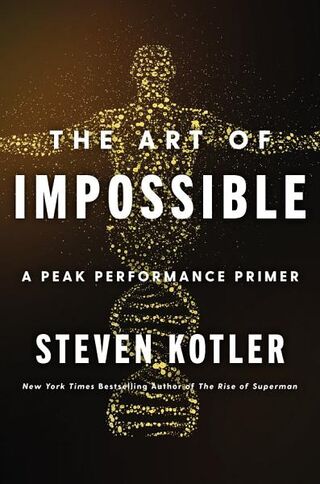Flow
Want More Flow? Then Schedule Your High-Flow Activity Weekly
Ideas from Steven Kotler's new book, "The Art of Impossible."
Posted January 19, 2021
When asked how he accomplishes so much as a professional writer, Steven Kotler's answer is a bit counterintuitive: "I throw myself down a mountain two days per week on my skis."
What he is describing is what he calls his primary or "highest" flow activity. This idea of "highest-flow activity" from his latest book, The Art of Impossible, really stood out to me.

The Art of Impossible breaks down the "formula" or process for transcending the impossible as a way of life. This includes overcoming our own personal lower i impossibles, and sometimes, along the way, doing something that has never been done before in history.
Also, from Kolter's perspective, flow is always involved when someone either breaks their own perceived limits (what he calls, lower i impossible), or when someone or a group of people do something that has never been done before (what he calls, capital I Impossible). Flow is the state of being completely absorbed in what you're doing. It's how you unlock your highest possibilities. It's essential for learning, creativity, and high-performance in every discipline.
An example of lower i impossible is doing something that seems impossible to you, such as healing past trauma, becoming a professional author, finding the love of your life. We all have our own limits based on lack of resources, lack of knowledge, or simply limiting beliefs.
An example of capital I Impossible is Roger Bannister running the four-minute mile or the Wright brothers taking flight. Capital I Impossible is all about breaking the barrier of what we collectively perceive to be an impossible task. History is littered with examples of things we once thought were impossible but are now commonplace.
The purpose of Kotler's latest book, The Art of Impossible, is to break down the "formula" or process for transcending the impossible as a way of life. This includes overcoming our own personal lower i impossibles, and sometimes, along the way, doing something that has never been done before in history.
I got an advanced copy of the book and was excited to read it. I'd read many of his other books and am always looking to have more flow in my life.
Highest-Flow Activity, at Least 1X/Week
Kotler argues that you integrate your high-flow activity into your weekly schedule. From his research, he's found that when you experience flow in your life, you get better at the habit of experiencing more flow.
This is why you want to identify your high-flow activity. What is something you did as a child, or at some point in your life, that allows you to get fully absorbed in what you're doing? It could be rock-climbing. It could be painting, or reading, or writing. For me, it's reading and running.
The point is that you must proactively schedule large blocks of time for this high-flow activity for no other reason than to be in flow. Yes, there are lots of other benefits. It's a form of active recovery, where you de-stress yourself. You experience positive neurochemicals like dopamine. You also train yourself to be in flow more often, which enables you to experience more flow at work and with your loved ones.
Active recovery is crucial to high-performance. Training yourself to be in flow more readily is also key. Experiencing the benefits of flow and not being stretched too thin also makes total sense.
Here's specifically what Kotler said about it:
WEEKLY: Two to six hours, one or two times a week: highest-flow activity (skiing, dancing, singing, whatever). These are the activities that often get edited out of our lives as responsibilities pile up and schedules get crowded. But the more flow you get, the more flow you get. It’s a focusing skill. So spending extra time in an activity that is all but guaranteed to produce flow will help maximize flow in activities that aren’t quite as flowy. During this activity, try to deploy as many flow triggers as you can. Always push on the challenge-skills sweet spot. Be creative. Take risks. Seek out novelty, complexity, and unpredictability. Also, try to use these sessions to train grit, and to use one or more of your core strengths in a new way.
Call to Action
What is your high-flow activity?
How could you schedule more of it into your week?
What would it do for you to have more flow in your life?


